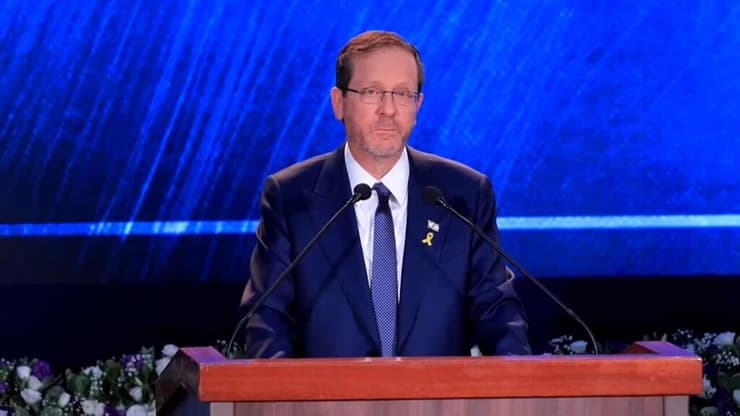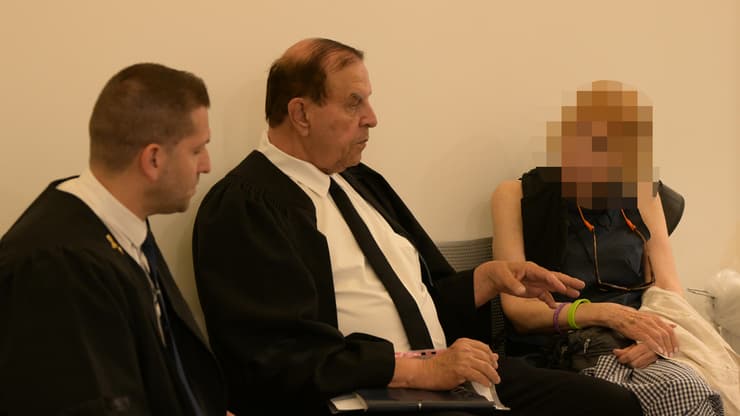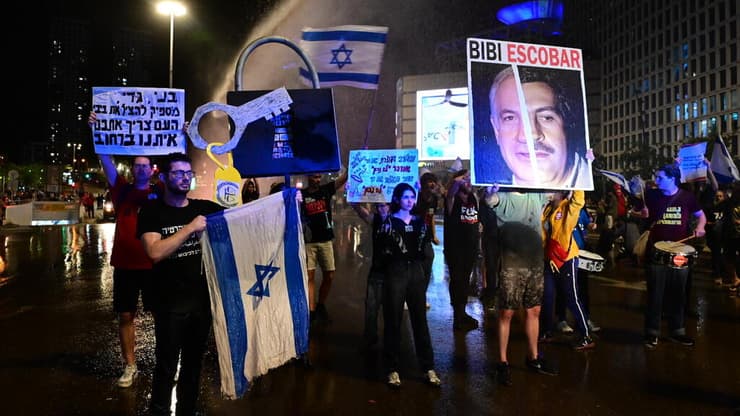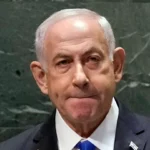The Prime Minister addressed the indictment against the 73-year-old protest activist for the first time – and criticized “public leaders” and law enforcement officials: “These threats to my life were built up in the face of their helplessness.” He noted that as opposition leader, he spoke out against the incitement against Rabin before the murder – and claimed, despite condemnations from protest organizations and the opposition: “Today – the voice of a thin silence.”
Prime Minister Benjamin Netanyahu addressed the indictment filed against the 73-year-old protest activist from Tel Aviv for the first time on Thursday evening , alleging that she planned to assassinate him. He criticized the incompetence of “public leaders” and law enforcement officials, and argued that “enforcement must change – and quickly.”
Netanyahu addressed the indictment in his speech at the state memorial service for Ze’ev Jabotinsky on Mount Herzl in Jerusalem. “Jabotinsky instilled in us the desire to constantly fight for what is right and just,” the prime minister said. “During Jabotinsky’s lifetime, countless insults were hurled at him. Unfortunately, this practice has not gone away, despite our desire to unite the people and to debate the limitations of acceptable discourse in a democracy. Despite this desire, the situation today is infinitely more serious. Today, these are not insults – but concrete threats to the life of a prime minister in Israel.”
According to Netanyahu, “These threats were gradually built up in the face of the helplessness of law enforcement officials, as well as of many public officials and public leaders. As the leader of the opposition, I spoke out against the calls for ‘traitor’ to the Prime Minister of Israel (Yitzhak Rabin – EI), let alone incitement to assassinate a prime minister. Everything is documented, everything is filmed.” Despite a series of condemnations from opposition parties and protest organizations against the government, he claimed in a speech that “today, in the vast majority of cases, fortunately not in all of them – the sound of thin silence. This must change, and law enforcement must change, and quickly.”
President Isaac Herzog also spoke at the memorial ceremony and addressed this. “I was shocked to hear about the threats to assassinate the prime minister. In the midst of the Egyptian days, just days before Tisha B’Av, I ask: Have we learned nothing? Have we drawn no historical lesson? The entire public, and especially its elected officials, must rise to the occasion. It cannot be that we hear every day about another dangerous and divisive initiative, another boycott, another expression of open hostility,” the president said.

Herzog called on elected officials: “Show responsibility, lower the flames. We are in such a sensitive time that we are faced with a real existential obligation – to accommodate, respect, act with restraint and responsibility, to listen. Only in this way can we fulfill the will of Jabotinsky and the will of the founding mothers and fathers of our state. Only in this way can we fulfill the will of the fallen whose families are crying out – Enough! Only in this way can we protect our country, contribute to its prosperity and resurrection, preserve its Jewish and democratic character and build a shared Israeli tomorrow.”
Checked security arrangements, tried to get an RPG missile
The 73-year-old protest activist was charged today in the city’s District Court with the offense of attempted conspiracy to commit an act of terrorism. The indictment details the chain of events that led to her arrest – and the planning of the operation in which she planned to assassinate Prime Minister Benjamin Netanyahu.
According to the indictment, filed by Attorney Sarit Shemesh of the Tel Aviv District Attorney’s Office, the activist said during her interrogations that since she had “very little time left to live” due to her terminal illness, she was “ready to die with a gun for the struggle, to save the country.” She explained that she was “despairing of the state of the country and her medical condition,” and therefore decided to “harm symbols of government and sacrifice herself.” In later testimony, according to the indictment, she claimed to suffer from memory problems and hallucinations. She also said that she did not remember “speaking with the intention of harming Netanyahu.”

On June 23 of this year, the indictment states, the activist was diagnosed with a terminal illness. These days, the decision to assassinate the Prime Minister has been weighing on her mind, as a result of which her days are numbered. The activist, represented by attorneys Guy Erenberg and Giora Zilberstein, held several meetings on the subject, after a broad meeting that took place between eight protest activists, in which they discussed options for radicalizing the struggle on the street. She made several encrypted calls with protest activists on a digital app, in order to hide evidence, where she also asked to meet physically with those activists.
The defendant, who gave the impression that the meeting was urgent, invited a protest activist to her home. She asked to speak with him in the bedroom and leave her cell phone outside. She spoke with him about the planned assassination, and admitted that it was an operation she was planning to carry out due to her terminal illness. She mentioned to him the details of the operation that she had already prepared, including the security arrangements for Prime Minister Netanyahu.
The protest activist explained that he did not support the action, and asked her to wait and find other options for escalating the struggle. In another meeting between the two, again in the bedroom and without cell phones, the defendant explained that she planned to carry out the action despite the activist’s opposition, and asked him for assistance in obtaining an RPG rocket.

During this meeting, the protest activist decided to report what was happening to Gonen Ben Yitzhak, due to his background in the General Security Service. Ben Yitzhak immediately reported to the service, and she was arrested and interrogated. During her first interrogation, she confessed to everything, but after being confronted with the protest activist she had met in the bedroom, she denied everything and claimed that he was lying.
The court requested that the defendant continue the terms of full house arrest until the end of the legal proceedings against her. “Unfortunately, her illness, which led her to hatch a plan to kill the Prime Minister and thereby end her life, in the form of ‘dying my soul with the Philistines’ – still exists, and therefore the fear that she will again try to carry out her plan against the Prime Minister or any other figure in the government, is real and indicates a high level of danger,” it was noted.

